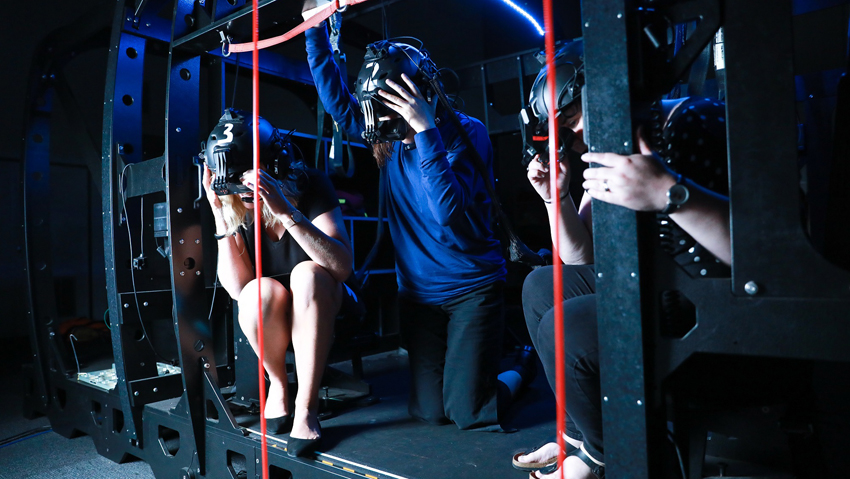UNSW has responded to a growing need within defence industry to leverage the growing capabilities of computer simulation, visualisation and immersive design to deliver an end-user focused capability for defence.
It may seem like an eclectic combination of professionals, ranging from nurses, clinical analysts, engineers and computer coders responding to a design challenge on a multi-billion warship, but the UNSW Master of Visualisation, Simulation and Immersive Design (MVSID) empowers professionals to learn from one another and deliver peerless outcomes to complex problems.
The Masters program offers a unique human-centric, design-led approach focusing on human perception and experience.
The course is designed to engage professionals from a breadth of experience and fields, empowering them to understand how, why, when and where to effectively utilise simulation and immersive platforms including Virtual Reality (VR), Augmented Reality (AR) and Mixed Reality (MR).
Further information on the course, including the applying for the latest intake, closing July 31st for Term 3 and close November 30 2020 for the 2021 intake is available here.
Dr Teresa Crea, Simulation Researcher and Development Lead for the MVSID course explained the importance of this focus in the Defence context, saying “The human-centric component is critical to the process, as it helps inform the way in which the humans will use the end-use product, the user experience is critical and how you design to the end goal. It is a concerning gap in the current technical focus.”
The program caters to the demands of professionals from diverse industry sectors. It can be studied full-time or part-time and is delivered via a range of flexible modalities incorporating online, face-to-face classes and creative studios. There are also opportunities to top up on skills via allied short courses and a graduate certificate.
Accounting for the high degree of professionals eager to sharpen their skills or broaden their academic credentials is a core target demographic for the course – accordingly, the low-residency program has been designed to accommodate busy professionals.
While the core courses are conducted online, two to three intensive face-to-face meetups per term on campus or at our industry partner facilities are available for the human element.
Most meetups will take place on the weekend to maximise flexibility – while students will also have full access to all campus facilities throughout each term.
To support the elective courses, students will be able to select from a range of fully online courses and on-campus face-to-face courses with weekly classes.
Dr Crea added, “The program came from a series of conversations with end users and operators in defence who stressed the importance of maximising and improving the prioritisation of the ‘end user’.
“The program is transdisciplinary which enables students to look at how fields and industries outside of defence utilise leverage visualisation, simulation and design – it enables a high degree of cross pollination.
“I am already seeing in the first cohort of working professionals from a range of fields, including experienced programmers through to clinical simulation skills, enables them to engage in a range of conversations and learn from a range of fields and lessons and experiences,” Dr Crea said.
Further information on the course, including the applying for the latest intake, closing July 31st for Term 3 and close November 30 2020 for the 2021 intake is available here.
As a target for experience professionals, the MVSID course also accounts for recognition of prior learning, which may be granted for formal, non-formal and workplace learning for specified credit in accordance with UNSW recognition of prior learning procedures for elective courses within the program.
“The recognition of prior learning, whether on the job practical experience or adhoc education allows access so students can receive a more structured, formal educational reinforcement for skills and lessons they may otherwise learn on the job and helps give graduates the opportunity to build the skills and knowledge basis to build on and enhance their practical skills,” Dr Crea explained.
The UNSW Faculty of Art & Design has been working with program partner Asia Pacific Simulation Alliance (APSA) and prime industry collaborators including CAE; Toll ACE Training Centre; Bohemia Interactive Simulation to ensure the qualifications and program experience are relevant to industry professionals
Further information on the course, including the applying for the latest intake, closing July 31st for Term 3 and close November 30 2020 for the 2021 intake is available here.




